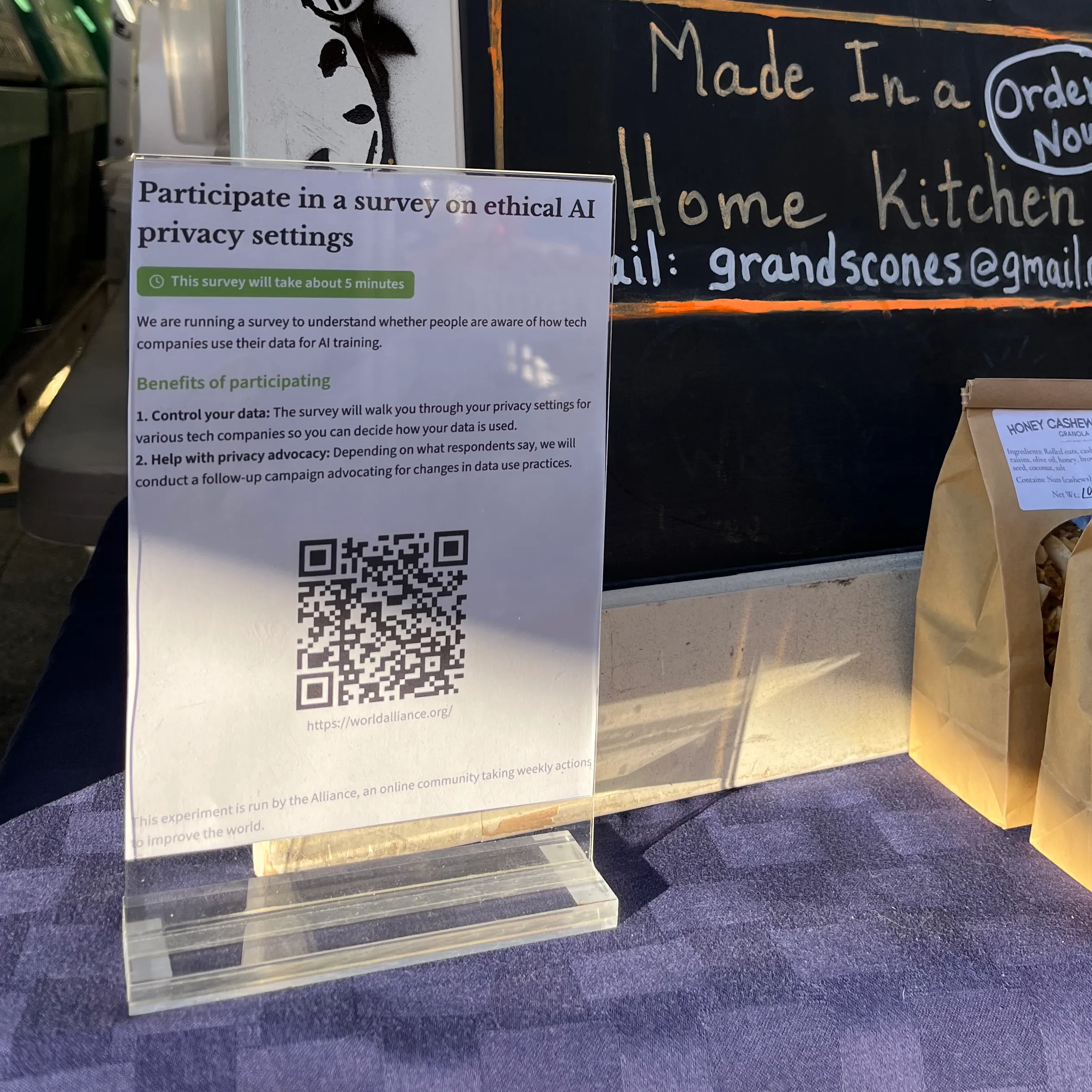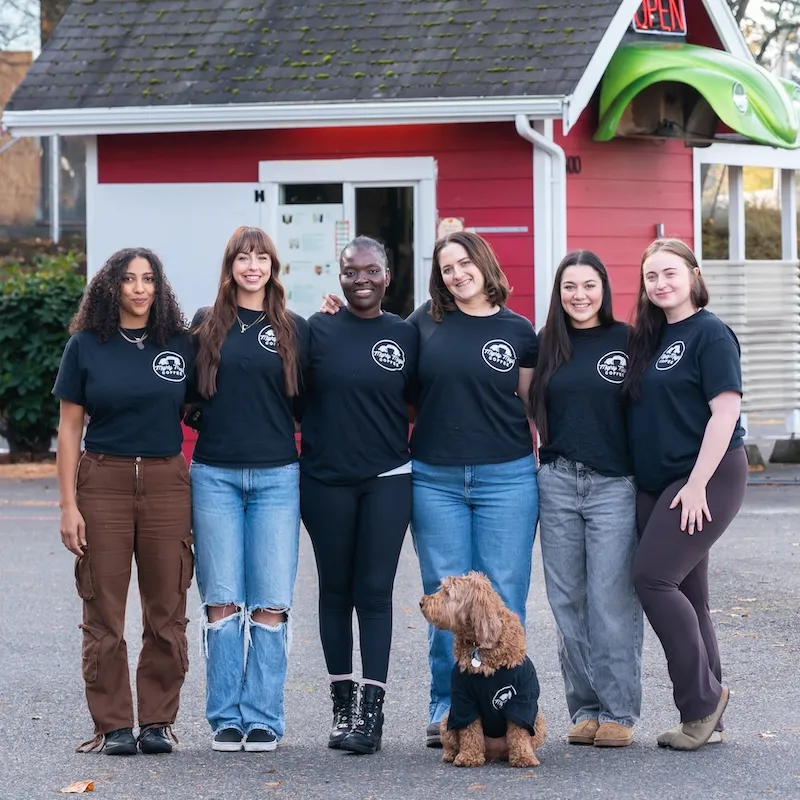Guide to the Alliance
The Alliance is a global group of individuals cooperating to improve the world. Each member spends a small fraction of their time completing tasks that advance our shared goals.
Our long-term goal is to unite humanity behind a democratic, expert-developed plan to end global crises. Right now, we are running experiments to test our organizational structures and processes.
Priorities
Our immediate goal is to end global crises that harm or will harm billions of current and future people. In no particular order, we are focused on:
- Extreme poverty
- Environmental destruction
- The decline of democratic institutions
- Dangerous technological development
How we work
Responsibilities
The Alliance is composed of a body of members and a full-time strategic office.
- The responsibility of the office is to develop plans, and corresponding tasks, that effectively advance Alliance priorities.
- The responsibility of members is to reliably complete tasks assigned on our online platform.
- I commit to complete up to 15 minutes of Alliance tasks per week.
- I commit to complete every task I am assigned by its deadline, unless:
- I have spent more than 15 minutes completing Alliance tasks in the past week.
- I cannot complete the task due to a serious external circumstance, such as a medical issue or family emergency. In this case, I will inform the strategic office as soon as I can.
- I believe the task is immoral. In this case, I will inform the strategic office of my reasoning by the deadline for the task.
- I understand that I am considered an active member, and am therefore able to participate in Alliance governance, if I have completed at least 8 of the last 10 tasks I was assigned.
Our current membership contract
The foundation of the Alliance is trust.
- The office trusts members to complete tasks, which allows the office to plan effectively. We maintain this trust with our membership contract, which restricts membership to those that can keep their agreements.
- Members trust the office to develop effective plans, which makes their duty as simple as completing their assigned tasks. We maintain this trust with governance processes and with regular communication between members and the office.
Coordination
Right now, we are taking small-scale actions focused on learning, not direct impact. Here are examples of actions we have taken recently:

Participate in an experiment to measure awareness of AI data use practices
Members were asked about their AI privacy preferences. The office will use the results to plan a follow-up awareness campaign in favor of opt-in, rather than opt-out, data use practices.
We will learn if surfacing members' preferences can help us generate awareness of important issues.
Approve proposals for how to spend $1,000
Members sent in and voted on proposals for how to spend $1,000 provided by a one-time donor. The $1,000 was ultimately split between Cool Earth and GiveDirectly.
We tested a process for rapidly reaching agreement in a low-stakes setting. The resulting donations offset a year of CO2 emissions for all participating members and covered about 5 months of expenditure for a household living in extreme poverty.

Report a pothole in your community
Members found and reported a pothole to their local government, most of which were repaired within a week.
Members learned about one way that local governments can respond quickly to citizen concerns. We reported 19 potholes and 1 broken wall in total.
Answer questions about nonprofit website copy and design
Members provided feedback on the copy and design of three nonprofit websites. The office sent the results to the nonprofits to help them increase their donation conversion rates.
The survey introduced members to some effective non-profits. Delivering the results to the non-profits showed that they respond positively to thoughtful feedback.

Sign a letter requesting news coverage of a bring-your-own-cup cafe coalition
The office asked several cafes to adopt and advertise a bring-your-own-cup policy, promising that members would help them attain media coverage. After the cafes took action, members signed a letter to journalists requesting a feature. Finally, a journalist wrote an article about the cafes.
We learned that offering to help businesses attain media coverage can encourage policy changes. The policy change itself will likely reduce a small amount of waste.
As the Alliance grows, we plan to bring together experts from diverse fields to make increasingly impactful, long-term plans. Our online platform will enable direct communication between these experts and millions of members to enact rapid, large-scale change.
A few broad categories of actions include:
Pooled funding
We can pool funding for ambitious initiatives, some of which would otherwise depend on governments.
For example, we could fund and oversee an independent scientific and industrial coalition to decarbonize the global economy.
Economic pressure
We can shift our consumption to encourage ethical practices and eliminate harmful practices.
For example, we could enforce a transparency standard by asking members to only purchase from companies that meet it.
Social pressure
We can target messages at decision-makers and direct public attention to important issues.
For example, we could run an individualized education campaign to support a multilateral AI governance treaty.
Central communication
We can establish a base of common knowledge to build agreement over time.
For example, we could ask members to spend a small amount of time each week reading the same news.
Direct action
We can use our own skills and resources to advance our priorities.
For example, we could design and participate in the largest citizen science projects in history.
Collective governance
We can maintain, improve, and govern the Alliance.
For example, we could use random member assemblies to deliberate contentious issues.
How we make decisions
Members provide input and participate in governance that ensures approval of the overall direction of the Alliance.
Meanwhile, the office has the freedom to make any plans that advance our high-level priorities and make effective use of members’ time and resources.
The office plans actions
Planning actions is a creative, open-ended process that searches for levers of change which members can pull.
In ideation for and development of an action plan, the office weighs many considerations. For instance:
- How does the action relate to the priorities of the Alliance?
- Will the action produce a tangible impact on the world?
- Will the action make effective use of members’ time?
- Will the action have any compounding effects – for instance, by providing an educational opportunity or growing the Alliance’s network?
Members oversee the office
Our governance guarantees that the majority of members believe the majority of their contributions improve the world.
We conduct a membership-wide oversight process that occurs on a regular basis. In the process, the office asks members what they think about the direction of the Alliance and whether or not they have any major concerns. The office collects and responds to feedback until we reach an approval threshold of 75%.
This procedure achieves two goals:
- Members determine the high-level goals and methods of the Alliance.
- The office retains the freedom to plan any action that advances approved goals with approved methods. It is not required to do what is most popular, nor do actions need unanimous support, so it can operate efficiently and effectively.
It is inevitable, though rare, that some members are assigned tasks whose justifications they do not agree with. Given the urgency of global crises, it is important that we collectively prioritize action over perfect consensus.
In addition to formal governance, the office incorporates member input by other means. For instance, the office hosts discussions, asks members for action proposals, solicits open-ended feedback, and so on.